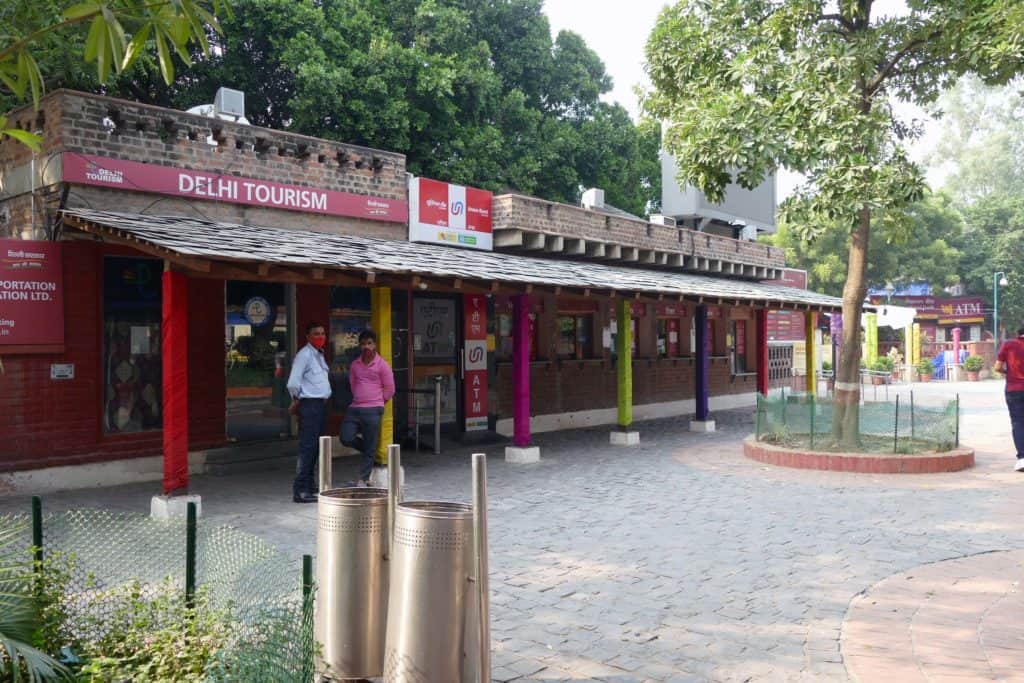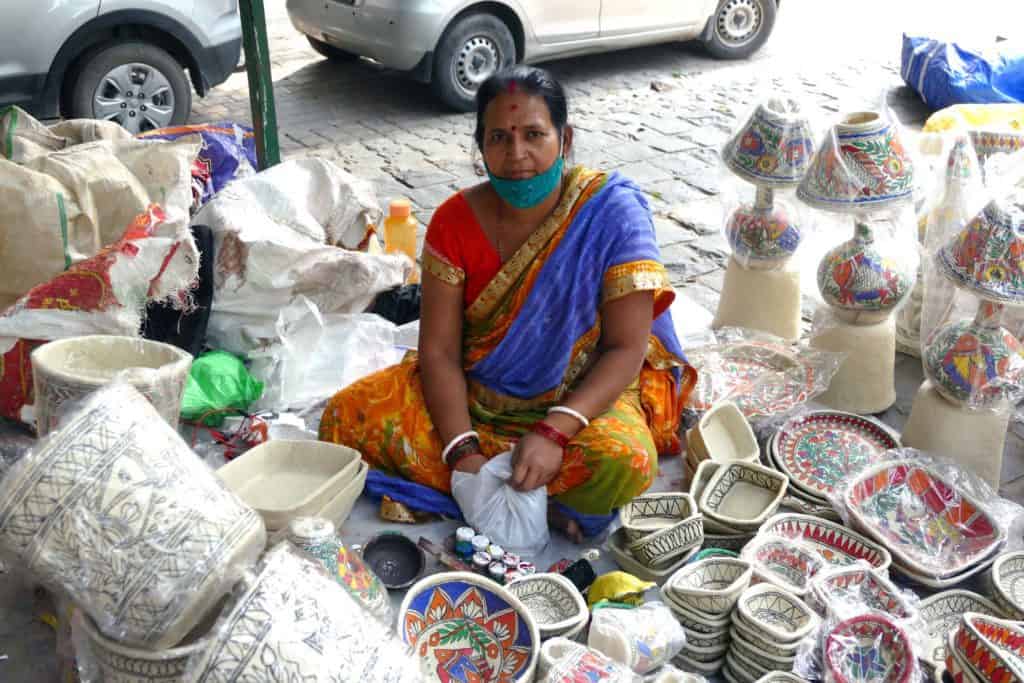Ritu Kumar is a known brand for top class bridal and fashion wear. On September 5th, despite the pandemic and every other shop owner complaining of negligible footfalls and even less sales, the brand opened a new store on the ground floor in New Delhi’s plush Khan Market, possibly the costliest pocket of real estate in the country.
It was the owner’s decision, said Neha, one of the young sales staff. Ritu Kumar, incidentally, already has a store spread over the first and second floor in the middle lane of the same market. That store now sells traditional bridal wear, while the new one sells modern fashion wear.
Only the rich can afford Ritu Kumar’s “Occassion Bridal Couture”. The designer possibly wanted to ensure that people walking past would stop to see her beautiful designed clothes, and hopefully step in to buy.
Delhi’s citizens are only now daring to take that brave step out of their homes as the capital unlocks. And while Ritu Kumar could hardly hope for the numbers that she used to get during past festival seasons, typically beginning with navaratri and continuing till the new year, she obviously is hoping that footfalls in her new shop will go up in the coming weeks.

We had reached the market a little past noon on a Saturday and there was not a single customer in the store: normally it would be bustling, as indeed would all of Khan Market.
Neha said about 8 to 10 visitors were dropping in these days, “which is better than last month.” Neha’s counterpart at Manan, an exclusive store dealing in handcrafted natural wearables, said the same thing. A peep into another upmarket store, Amrapali selling lovely silver and gold designer and traditional jewellery, saw red-jacketed staff swarming around a lone customer—normally one would have to wait to be attended.
Wary of stepping out
The festival season in New Delhi is a time of balmy winter sunshine, when the outdoor beckons. It is the season when people head to Dilli Haat, the open air textiles and handicrafts bazaar and food court in South Delhi, that was known to be always crowded. Dilli Haat opened its doors on September 3rd, but like in Khan Market, here too people were missing on a Saturday. Before COVID, a visitor would have to wait for 10 to 15 minutes in a snaking queue, before being able to buy the entry ticket.

“A fortnight ago, there wasn’t a soul,” said the young lady at the ticket counter. “Last weekend we issued 800-1200 tickets.” Incidentally, only one of the half a dozen ticket counters is open. Hari Kishore Singh, who ferries the goods of craftsmen and others who set up stalls in his cart, says that 80% of the stalls are full, though some artisans may have brought less goods to sell than in the past.
Outside the bazaar, Madhu Lal, who paints Madhubani designs on papier mache products that she makes at her Noida residence, has been sitting at that spot the last three years. “Now people are scared to come out, and not willing to spend,” said Madhu. After the lockdown was lifted, she has been here these last three months. Most days she earns nothing, some days she makes Rs 400 to 500. “I don’t blame them. They too must have lost jobs and salaries, have families to support and medical costs,” she says philosophically.

Craftsmen selling their products outdoors on the pavements or on the roads are seeing some customers and sales, like the iconic Tibetan Bazar in Janpath, where a new breed of drive-in customers are buying handicrafts, clothes, boleros and what have you.
Cars park outside the shops, customers wave, sign or call out to the seller standing outside. The latter walks up to the car and talks to the customers, goes back to the shop and returns with stoles or paintings or whatever. The deal is struck, package dropped in the car boot and payment made digitally.
Across the road at the renowned Tribhovandas Bhimji Zaveri jewellery store, about 15-20 people were inside. “Only now are people slowly coming out of the fear of the coronavirus, and resuming normal activity, which includes festival shopping,” said R C Juneja, the store’s spokesperson. “In north India, the festival season is really just before Diwali, a month away. People will come and shop then”.
Not far away, Khadi India, located at the heritage Regal building in Connaught Place, would normally be the most crowded store in the heart of the capital at this time because of its usual annual sale between Gandhi Jayanthi on October 2nd and Gandhiji’s martyrdom day on January 30th. This year being the 151st birth anniversary of the Mahatma, the four-storey shop is offering a 20% discount on everything.
But with all the corona related protocols, the shop is not bustling as usual, but it is not empty either: there are a few masked customers. “I did wonder whether it is worth the risk, coming here,” says Manisha Aggarwal, a 40-year old who has come from distant R K Puram. Manisha is aware they have an online store, but decided to wear a mask, carry her sanitiser and go shopping.
New trend: Event Weeks
COVID-19, job losses and salary cuts, no Diwali bonus and an uncertain future are all contributing to this muted festival shopping. But sales staff at most places are confident that things will look up somewhat as Diwali nears. It is not just stores, big and small, old and new, which woo and retain customers with tempting discounts and other offers. The festival season is also when corporates plan their sales and marketing calender for the year.
But with changes in consumer behaviour becoming starkly visible, “the phenomenon of ‘event weeks’ is rewriting the rules of modern trade,” says Shrikant Kulkarni, Director, Retail Services, Nielsen India. “Never before in the history of Indian retail have shoppers taken so fervently to this marketing strategy by retailers.”
“Event weeks” refers to offering special discounts and schemes to tempt shoppers for a whole week around festivals like Diwali, Holi, Pongal etc, to which the retailers have added national holidays— for example, a week filled with tempting offers to bring in shoppers around Republic Day and Independence Day. In fact, many retailers even offer discounts and schemes that may include interest free EMI, in the first week of a month –the event being pay day!
In a 2013 report, Nielsen said Diwali sales was 34% more than the same week in the previous year, and attributed it to the bonus payments that people received! And in 2017, Hero Moto Corp proclaimed a blockbuster festive season after it registered the highest-ever-single-day retail sales of well over three lakh units on Dhanteras, first day of the five-days long Diwali festivities. Automobile companies are hoping for a similar surge this Dhanteras too.
Says Kritika Singh, an officer in the PNB in Sansad Marg: “The number of vehicle loan applications we have received is a lot more than last year. People want to buy cars and two wheelers, possibly because they would prefer not to use public transport in this pandemic.”
An independent director of a pre-owned vehicle company, not wanting to be identified, said that on that single day, the sales in several categories would be the equivalent to 10 to 30 days of sales at other times. He expects the 2020 festival season to be a good one for personal vehicles.
Online, the place to be
That, however, is not the same for other product categories. Kritika who is 32, for instance, has decided not to splurge on anything in the lifestyle segment this season. Buying gold on Dhanteras was something her mother did, but with the glittering metal crossing Rs 50,000 a tola (10 grams), she does not think it worth spending on.
Sushma Gupta, a 28 year old, too has decided not to shop despite the heavy discounts that most brands are offering. “There are no weddings, receptions, parties that I will be attending personally this season,” says Sushma. “So I don’t have to buy a new gown or saree for any occasion. In any case, if I need anything, I will shop online, not at any of the stores.”
Which means stores will need to create an online shopping experience to keep their customers. According to shoptimize, an AI powered “mobile-first” company focused on designing and developing eCommerce technology, “The challenge now is to effectively tap all the new touch points of a buyer’s journey that has been transformed by the pandemic. Brands gearing up for the festival should run a thorough health check of their D2C channel and actively start engaging users to grab a place in their festive wishlist.”
Cautious consumer
Most surveys show that consumer intent to purchase offline still remains low. A buyer behaviour analysis by Nielsen showed that consumers’ intent to buy durables has significantly increased, but with purchases happening predominantly online.
“A rather disturbed consumer may actually become more positive and show a glimmer of hope as he approaches the opening of different shopping opportunities,” say Sridhar Samu, Senior Associate Professor at Great Lakes Institute of Management, Chennai and Ambi Parameswaran, an Adjunct Professor of Marketing at SPJIMR, Mumbai, based on a consumer behaviour survey they did a couple of months ago.
Samu and Parameswaran, in their study have identified four different types of shoppers in this unlock period—Restricted shopper, revenge shopper, revelation shopper and research shopper, a category they chanced upon in the course of their survey.
The restricted shopper will be very cautious, singed by the Covid crisis, and will carefully decide what to buy and when to buy, be very reluctant to shop online or face to face, more so if they are earning less than Rs 1 lakh a month. Revelation shopper is one who has realized some urgent home product need—a fridge replacement or an air purifier for instance. The Revenge shoppers would be those who have waited for the unlock to rush and buy luxury goods, fashion accessories etc. And the Researched shopper is the bargain hunter.
For this category, everything other than essentials—food, fuel, medicines—is now going at a discount. At the Pacific Mall in Tagore Garden, Zara was offering 70% discount…as are other big lifestyle brands. The mall was bustling even if people were not shopping.
The reality is that salary hikes and bonus will be negligible or non-existent for the next couple of years at least. The effect of this on consumer behaviour is that most of them will be careful, spending largely only on food, health and essential replacement of white goods.